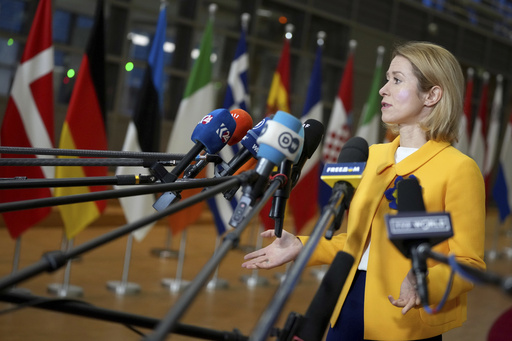BRUSSELS — On Monday, the European Union initiated a gradual relaxation of energy and transportation sanctions, as well as banking restrictions on Syria. This move aims to revitalize the economy of the war-torn nation, contingent upon the new leadership’s commitment to fostering a peaceful future.
Since 2011, the EU had implemented various sanctions, including asset freezes and travel bans targeting Syrian officials, banks, and institutions, in response to former President Bashar Assad’s severe crackdown on protesters, which escalated into a civil conflict.
Following Assad’s swift ousting during a major rebel offensive in December, the Hayat Tahrir al-Sham (HTS), the leading faction formerly involved in the rebellion, established an interim government. This administration has pledged to create a new governing body through an inclusive process by March.
In a bid to support this new leadership, the EU announced the suspension of measures affecting the oil, gas, and electricity sectors, as well as transportation, particularly the aviation industry. The EU will also reinstate options for funding and providing specific economic resources to five selected banks.
Furthermore, restrictions on the export of luxury items to Syria for personal use will be loosened. This decision was reached by EU foreign ministers and is part of broader efforts aimed at facilitating an inclusive political transition in Syria, alongside rapid economic recovery, rebuilding, and stabilization.
While the EU intends to monitor the situation closely to consider the lifting of additional economic sanctions, there remains the option to re-impose restrictions should the new leadership deviate from the desired path.
Recently, former HTS leader Ahmad al-Sharaa was appointed as Syria’s interim president during a gathering of numerous former rebel factions. These factions collectively agreed to abolish the existing constitution, dissolve the former national army and security services, and discontinue official political parties.
International expectations are mounting for al-Sharaa to fulfill commitments regarding an inclusive political shift. Geir Pedersen, the U.N. special envoy for Syria, emphasized that the establishment of a “new inclusive government” by March 1 would play a key role in determining the potential lifting of Western sanctions.
Copyright @2024 | USLive | Terms of Service | Privacy Policy | CA Notice of Collection | [privacy-do-not-sell-link]


